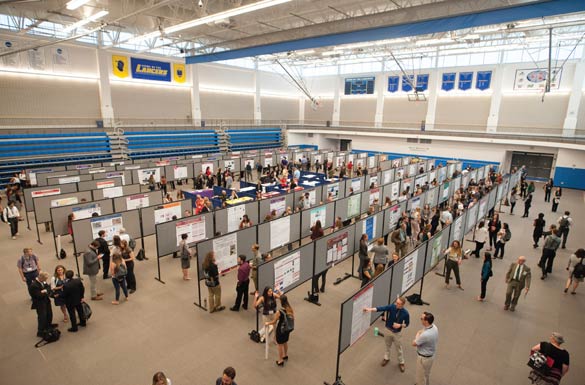Symposium features research of hundreds of veterinary students
Nearly 600 veterinary students from the U.S., Canada, and beyond attended the 30th National Veterinary Scholars Symposium, held July 24-27 at Worcester State University in Worcester, Massachusetts, with some students coming from as far away as France, Germany, and the Netherlands.
Cummings School of Veterinary Medicine at Tufts University hosted the symposium, which showcases accomplishments by mostly first- and second-year veterinary students completing biomedical research projects for 10 to 12 weeks during the summer. Each veterinary scholar is assigned a mentor and laboratory and conducts a hypothesis-driven research project developed by the scholar and mentor. The students also attend seminars and discussions on careers in science. At the end of the program, scholars present their findings to peers and attending faculty. This year's theme for the symposium was "Engaging Veterinarians to Advance Human and Animal Health."

Welcoming the students to the symposium were Dr. Alastair Cribb, dean of the veterinary school; Dr. John de Jong, 2018-19 AVMA president and a 1995 graduate of the school; Dr. Andrew Maccabe, CEO of the Association of American Veterinary Medical Colleges; and Everett Hoekstra, president of Boehringer Ingelheim Animal Health USA Inc.
Terence Flotte, MD, dean of the University of Massachusetts Medical School, delivered the keynote address, "Impact of Research Collaborations Between DVMs and MDs." Dr. Tim Leard of Boehringer Ingelheim gave a plenary address on "Vaccines and Immunotherapeutics: Experiences and Opportunities in Animal Health." Charles Shoemaker, PhD, of Cummings gave a plenary address on "How Re-engineered Antibodies from Camelids may be the Antibody Therapeutics of the Future."

The symposium highlighted the ways that veterinary scientists advance basic and applied research to support evidence-based medicine and enabled participants to gain insights into careers in biomedical research. The meeting featured poster presentations from veterinary students. Students and faculty also attended breakout sessions on critical care, antimicrobial resistance, regenerative medicine, cancer biology, infectious diseases, and pathways to research career development.
The symposium included presentations by the four winners of the AVMA Excellence in Research Awards (see story) and the five finalists in the Early Stage Investigators Awards. Dr. Heather Gardner, a final-year doctoral student at Tufts, received first prize in the Early Stage Investigators Awards, which are supported by the American Veterinary Medical Foundation. The AVMF also provides stipends for five veterinary students who are conducting a second year of summer research.
Boehringer Ingelheim presented its Veterinary Graduate Award to Dr. Amy Stieler Stewart and its Veterinary Research Scholar Award to Mariel Covo, a fourth-year veterinary student. The company also funded a challenge grant supporting $5,000 stipends for half of the veterinary students participating in the Boehringer Ingelheim Veterinary Scholars Program this past summer, which is matched by the participating universities for the remaining participants, according to a BI press release. The numbers of company-sponsored students and schools participating with the BI program have more than doubled since 2000, from 54 students at eight schools to more than 100 students at 42 schools in 2019. Since its inception, more than 3,500 veterinary students have participated in the annual program.
Ahead of the symposium, the AVMA provided the abstract submission service and compiled the electronic abstract book. This year, 559 student abstracts were submitted, up from 513 last year.

Read about the contributions of some previous veterinary scholars.
Get more information about the Boehringer Ingelheim Veterinary Scholars Program.
Related JAVMA content:
AVMA presents 2019 Excellence in Research Awards (Oct. 1, 2019)